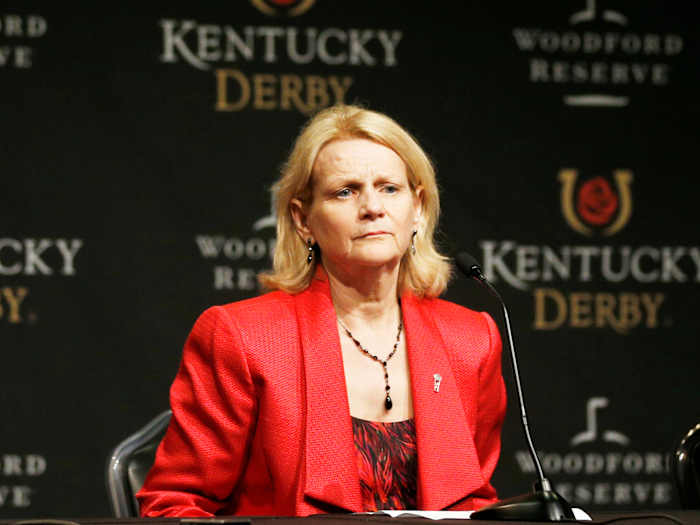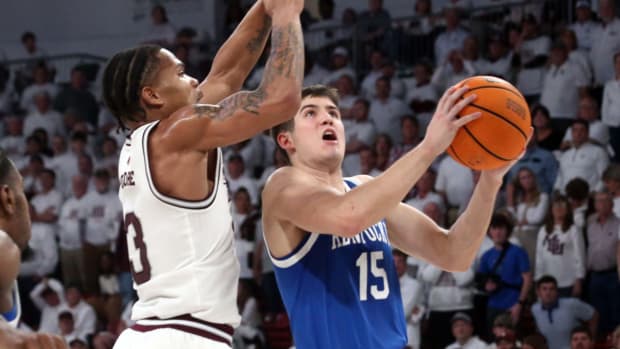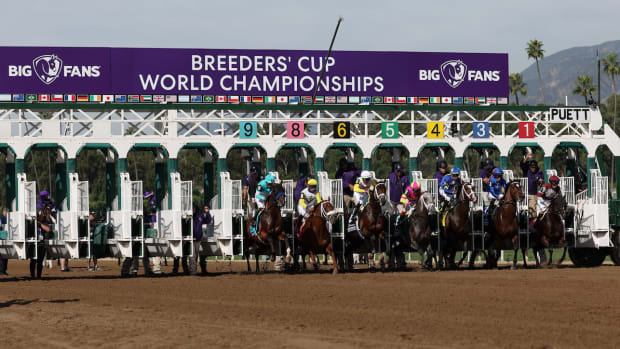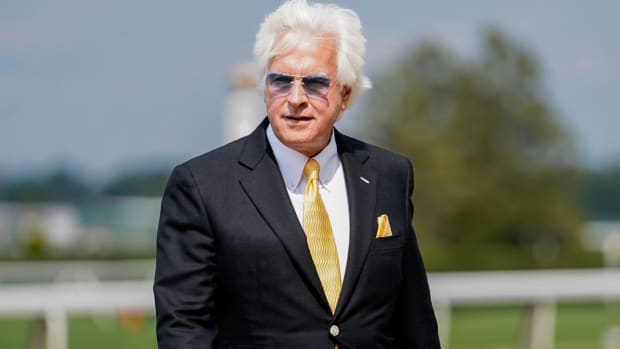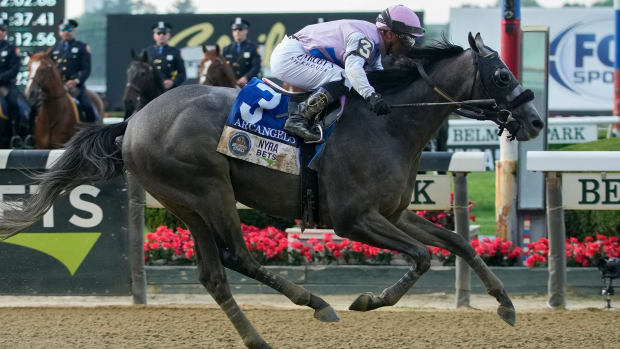As Questions and Confusion Linger, This Kentucky Derby Hangover Isn't Close to Over
LOUISVILLE – This city awakens every year on the first Sunday in May with a collective hangover—a head that throbs from too many mint juleps downed, too many cheap cigars smoked and too much money lost. It has been ever thus, the price for hosting a Saturday party that begins before dawn and ends long after midnight and does not take prisoners. But on this particular Sunday, as leaf blowers swept away worthless betting tickets and teenaged volunteers scraped flattened Bud Light cans off the walkways, the pain ran just a little deeper and threatened to last a little longer. This was the Derby that would not end, and will not end. A Derby that may yet be decided in a boardroom or, heaven help us all, a courtroom. A Derby that will be remembered when the children of the grownups in attendance are long gone.
You know the story by now. In the misty gloaming of Saturday evening, a lightly raced former $16,000 claimer named Maximum Security went wire-to-wire to win the 145th Kentucky Derby, floating over the slop formed by late afternoon rains and coming home clean, the winner of the most important horse race in America by 1 3/4 lengths, very much to the delight of a crowd of more than 150,000 who had made him the second betting choice (4.5-1) in the field of 19 3-year-olds. Owner Gary West, a wealthy 73-year-old with four decades in this unforgiving game, was hustled across the sloppy racetrack to the infield veranda for the trophy ceremony. Trainer Jason Servis, 62, made it across that same track to the inside rail when the announcement came from race caller Travis Stone over the track’s public address system. At least one jockey—eventually, two—had claimed foul against Maximum Security. There was a roar, and then a buzz, and then a wait that lasted 22 minutes.
You know the second part of the story, too: After those 22 minutes, the Derby stewards disqualified Maximum Security for interfering with hard-charging War of Will when both horses were approaching the top of the stretch, in turn causing War of Will to interfere with Long Range Toddy and in turn causing Long Range Toddy to interfere with Bodexpress, who then bumped slightly into 65-1 longshot Country House, who crossed the finished line second. Maximum Security was placed 17th, behind Long Range Toddy, the lowest-placed horse he bothered, and Country House was elevated from second place to first, the second-longest-priced winner in the long history of the Derby. It was the first time in the history of this race, which was first run in 1875 when Ulysses Grant was president, that the first horse beneath the finish wire had been disqualified for an act committed during the race.
There were sustained boos at this decision, because as the near-favorite, Maximum Security had run with many millions of dollars at stake. There were tears, shed by his jockey, 27-year-old Panamanian Luis Saez. There was wide-eyed wonder from Servis, who had come impossibly far, only to have roses snatched from his fingers. There was the gutting disappointment felt by West, because how many chances does he have left? And there was the awkward joy expressed by winning trainer Bill Mott, like a teenager hugging his first date beneath a streetlight, embracing the biggest moment of his career at arms length. “I felt terrible that I had to apologize for winning the Kentucky Derby,’’ Mott said on Sunday morning, under a grey sky, in autumnal temperatures. “It’s such an unusual way to win the Kentucky Derby. It’s a little numbing, really.”
And then it was over, and the fans emptied into the night. Except that it was not over. And it is still not over.
Fans took aggressively to social media—because 2019—to debate the righteousness of the rule and unspoken tenets of the Derby. One of those fans was the current U.S. president, Donald Trump, an apparent closet railbird, who tweeted Sunday morning, “The Kentucky Derby decision was not a good one. It was a rough & tumble race on a wet and sloppy track, actually, a beautiful thing to watch. Only in these days of political correctness could such an overturn occur. The best horse did NOT win the Kentucky Derby - not even close!” Trump was subsequently quote-tweeted by Rudy Guiliani, whose message was much the same vein. It remains uncertain where political correctness enters into the dissection of a roughly run horse race.
Meanwhile, West and Servis moved to make good on emotional, but not fully formed, threats leveled after the disqualification to appeal the ruling. West said that on Sunday morning he asked for a meeting with the three stewards—two employed by the state of Kentucky and one by Churchill Downs—to review the race and hear their explanation in person. (It is worth noting that the stewards did not take questions from media Saturday night; head Kentucky Horse Racing Commission steward Barbara Borden nervously delivered a 107-word statement to explain the disqualification. The statement was clear as far as it went and Borden’s nerves were understandable considering the gravity of the moment. But the stewards’ failure to take questions was a misstep that left giant gaps).
West said, via text message, “The stewards refused to let us see their video until Thursday and they will not talk to us or answer questions to the press—complete lack of transparency.” It is unclear why the stewards would not share video or an explanation with West, except that they are not back at work at Churchill until then, and because they are not obligated to meet with disqualified owners. But their reticence clearly angered West, and pushed him toward appealing the decision. “Ninety-nine percent of people interested in racing feel there was a complete lack of transparency on the part of the stewards.”
West told me via text that he was weighing an appeal, but first will look more closely at the race. “I will have some objective experts review the video which the stewards have refused to show us until Thursday—complete lack of transparency.” However, the relevant statute in the racing commission rules do not allow for appeals, stating, “Findings of fact and determination shall be final and shall not be subject to appeal.” Any appeal is virtually a Hail Mary.
West is undeterred by this. “Depending on what we see, Federal Court is definitely an option.” It is unclear at this point when West will make a decision. NBC’s Today Show taped an interview with West on Sunday at his home in Rancho Santa Fe, Calif. Also unclear is whether West might return to Kentucky to meet with the stewards, although that seems to be dependent on his further examination of the video. There is confusion in the air. Only once in the race’s history, has a Derby result been taken to court. In 1968, Dancer’s Image was first across, but disqualified for a drug violation. Owner Peter Fuller fought the DQ for five years before giving up. Forward Pass was declared the winner and is recognized as such in history.
As West considered these options, some trainers supported the decision of the stewards. First, a brief review of what the head-on video (not the so-called “pan” shot that is most commonly used on television broadcasts) showed: as the field prepared to straighten out at the top of the stretch, Maximum Security was leading and, while tiring, moving more efficiently than most other horses in the field. Suddenly he darted to his right, at least three “paths” over (a path being an imaginary lane in which a horse travels in a straight line). As Maximum Security moved, he passed in front of War of Will. Photos and video captured War of Will’s front legs actually passing in between Maximum Security’s rear legs, a perilous circumstance.
War of Will’s jockey, Tyler Gaffalione, kept both his horse and himself upright, a stunning feat of horsemanship. “Horse racing should be very happy that that happened to War of Will,” said Mark Casse, War of Will’s trainer. “War of Will is such an athletic horse, and so agile, that he didn’t go down. If he did go down, that would have been a huge disaster for horse racing. Who knows how many others would have gone down.”
(Casse spoke apocalyptically, but after the 23 horse deaths at Santa Anita from Dec. 24-March 31, there is truly no overstating the role of horse safety in today’s zeitgeist).
In staying on his feet, War of Will indeed smashed into Long Range Toddy. Both War of Will and Long Range Toddy faded after that, as did Bodexpress, the next horse in the chain reaction. “Both of those horses did not recover at all,” said Mott. Meanwhile, Country House continued on to a solid second-place finish.
It seemed clear to many experienced observers that something unusual had happened. At this point, stewards are allowed to immediately illuminate the “inquiry” light to indicate to the bettors that they are taking a closer look at the race. They did not do this, and because they did not take questions from the media, it remains unclear whether they were preparing to do so. It was ultimately unnecessary, because jockeys Jon Court (Long Range Toddy) and Flavien Prat (Country House) claimed foul against Maximum Security. It was surprising that Gaffalione did not. Mott said Sunday morning that it was he who encouraged Prat to claim foul after Jose Ortiz, the jockey on Mott’s other horse, third-place finisher Tacitus, told him that Maximum Security, “has to come down.”
That is what eventually happened. After those 22 minutes had passed, Country House paid $132.40 to bettors and earned $1,860,000 for his connections. Maximum Security paid nothing for his backers and earned nothing for West and Servis.
Casse, whose horse did not benefit from the disqualification (except by moving up from eighth place to seventh, for no purse money), stood staunchly behind the disqualification. “The only reason it took so long to take him down is because it was the Kentucky Derby,” said Casse. “But he [Maximum Security, not Saez] put people’s lives and horses’ lives in danger by his actions. Did he do it intentionally? Absolutely not. But he did it.”
Near Casse’s barn at Churchill, Hall of Fame trainer Todd Pletcher, whose horses won the Derby in 2010 and 2017, said, contrarily, that the DQ could be a positive for the sport. “I think in some ways it could be a great thing for racing,” said Pletcher. “We proved that in the sport’s biggest moments, you have to make the tough calls. I feel badly for Maximum Security and his connections. I don’t know what spooked him at the top of the stretch and caused him to veer out. Ultimately, I think he was going to win the race, but he bothered some horses.” (“Bothered,” in racetrack parlance, is a stronger verb than in everyday English). “By the rule book, it is the right call,” said Pletcher. “There is no question that he veered out and interfered with a couple horses. Very tough call.”
One dissenting voice on the backstretch was another Hall of Famer trainer, five-time Derby winner Bob Baffert. During the race, Baffert stood in the saddling paddock, where he watched American Pharoah win the 2015 Derby and near the small room where he watched Justify win it a year ago. Baffert suggested that the Derby is just a different race from all others, and that everyday rules should not always apply. “No one ever calls an objection in the Derby,” Baffert told me Sunday afternoon, by text. “It’s always a roughly run race. Twenty-horse field. I have been wiped out numerous times, but that is the Derby. I can see by the book why they did it. But sometimes you’ve got to take your ass-kickings with dignity.”
And this: “One thing that got lost in all of this is Maximum Security is the real deal. He’s the best three-year-old in the country.”
Perhaps he will prove it decisively two weeks from now at the Preakness in Baltimore. (Update: He won't. West told NBC's Today Show that with no Triple Crown on the line, he won't run in the Preakness.) Perhaps he will seek validation even sooner, in a courtroom somewhere in Kentucky. The Derby was run in just a tick over two minutes, as ever, but in bluegrass dreams, never really ends. This is not a dream.

